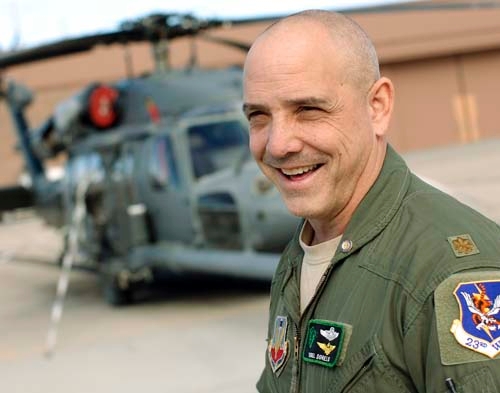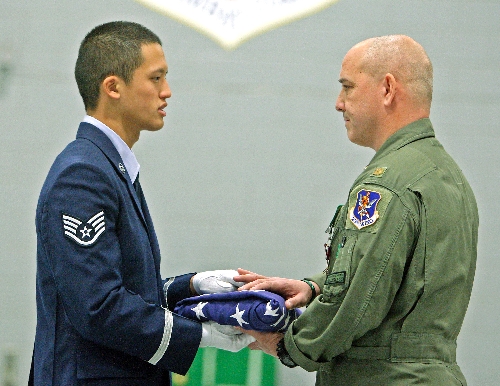Pilot retires after four branches of service
When the Army-Navy game kicks off today, Yogi Dorelis will be rooting for Navy. But he could just as well put on a "Go Army" T-shirt. Or the Air Force blue one. Or the red-and-yellow one from the Marine Corps, even though "the few" and "the proud" don't have a college team.
That's because Maj. Yonel "Yogi" Dorelis, who retired Friday as a rescue helicopter pilot at Nellis Air Force Base after a 28-year military career, has worn four different armed forces uniforms. He flew Navy-Marine CH-53 Sea Stallion and Super Stallion helicopters, Army National Guard UH-1 Hueys and Air Force HH-60 Pave Hawks.
While he's not much of a college football fan, preferring his hometown New York Giants of the National Football League, Dorelis said he'll be leaning toward Navy in the game today because the Marine Corps launched his career.
"The Marine Corps gave me the best foundation," he said, standing outside the 66th Rescue Squadron hangar at Nellis after commanders and airmen spoke of his outstanding career, clipped another medal on his jumpsuit and gave flowers to his wife, Karen, and their two daughters.
"Any success I've had in the military is a result of the things I learned as a Marine and the qualities that were instilled in me as a Marine officer," he said. "That said, the Navy gave me the opportunity to fly and the Army gave me an opportunity to fly after I left the (active duty) military for a while."
The dozen years he spent in the Air Force flying Pave Hawk helicopters gave him the most opportunity to do what he has done for a living since 1982, rescue people from dangerous situations -- 53 in all -- often risking his life to get the job done.
The list of those he's saved includes not only military personnel but civilians, such as the two teenagers he plucked from an island on Lake Mead after their personal watercraft ran out of gas. Then there was the skier on Mammoth Mountain he searched for and the lost hiker in Idaho whom he found.
"The mission that I've had the opportunity to do these last 12 years, especially since 9/11, I wouldn't trade for the world," the Manhattan native said with a gleam in his eyes and a smile that stretched cheek-to-cheek.
"The opportunity to save lives, especially saving lives in combat, is pretty much the most noble thing and probably the most rewarding thing you can do in the military."
The Sept. 11, 2001 terrorist attacks hit close to home.
His brother worked at the World Trade Center but survived the tragedy when hijacked jetliners that crashed into the twin towers.
"The big thing for me was knowing my brother was safe. There was a period of time we didn't know if he was dead or alive."
But Michael LaForte, a friend from Marine Corps Officer Candidate School, was working for a financial company inside the World Trade Center and died that day.
"Obviously, 9/11 was personal for me," Dorelis said. "So going to Afghanistan, being one of the first folks in Afghanistan, that was good stuff to be out there and be at the tip of the spear and be able to be in the first round of payback."
His most memorable rescue came March 3, 2002 during Operation Anaconda when U.S. soldiers were fighting enemy combatants on the snowy mountains of eastern Afghanistan. Thirty-nine soldiers had been pinned down; 10 were wounded and eight killed in action.
He was flying co-pilot with pilot Thomas Cahill. They lost rotor speed because of the heavy load above the mountainous terrain. Rocket-propelled grenades whisked past their Pave Hawk in their attempt to rescue three of the wounded.
"There was shooting," Dorelis recalled. "It was scary and we were low on gas and all those things but it worked out."
What was going through his mind at the time?
"You're thinking, 'Wow. Maybe I should have listened to my mom and been a doctor or a lawyer.' There was a point where I thought it's going to suck if I die out here in this desolate wasteland. You know, there's a guy out there bleeding out so you've just got to get it done.
"And the old cliche about being too busy to really be scared, that's true. I don't ever recall being catatonically terrified. I just remember thinking, 'I guess you could probably get killed out there. You just got to do the job.' And, like I said, it worked out."
For their heroic efforts, Cahill received the Silver Star medal and Dorelis was awarded the Distinguished Flying Cross.
In retirement, Dorelis said he intends to keep flying civilian helicopters.
He also wants to try his hand at novel writing and possibly do some acting. During his break in active duty service when he was with New York's Army National Guard, he worked in a Broadway box office and was there for the opening of the musical "Rent."
Contact reporter Keith Rogers at krogers@reviewjournal.com or 702-383-0308.























